
Sir Isaac Newton was an English polymath active as a mathematician, physicist, astronomer, alchemist, theologian, and author who was described in his time as a natural philosopher. He was a key figure in the Scientific Revolution and the Enlightenment that followed. His pioneering book Philosophiæ Naturalis Principia Mathematica, first published in 1687, consolidated many previous results and established classical mechanics. Newton also made seminal contributions to optics, and shares credit with German mathematician Gottfried Wilhelm Leibniz for developing infinitesimal calculus, though he developed calculus years before Leibniz. He is considered one of the greatest and most influential scientists in history.
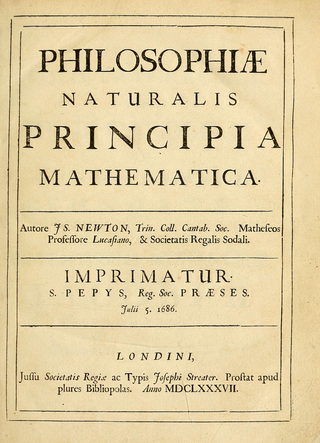
Philosophiæ Naturalis Principia Mathematica often referred to as simply the Principia, is a book by Isaac Newton that expounds Newton's laws of motion and his law of universal gravitation. The Principia is written in Latin and comprises three volumes, and was first published on 5 July 1687.

Robert Hooke FRS. was an English polymath, active as a physicist, astronomer, geologist, meteorologist and architect. He is credited as one of the first scientists to explore living things at microscopic scale, using a compound microscope that he designed. An impoverished scientific inquirer in young adulthood, he became one of the most important scientists of his day. As a surveyor and architect, he found wealth and esteem by performing over half of the property surveys after London's great fire of 1666 and assisting in the city's rapid reconstruction. In recent times, he has been called "England's Leonardo".
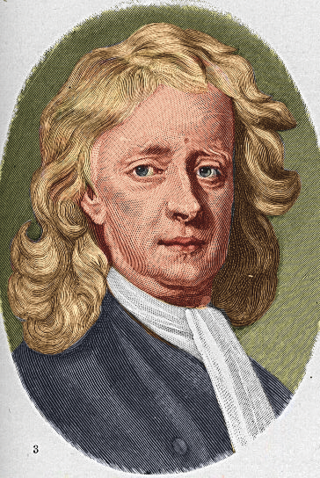
English physicist and mathematician Isaac Newton produced works exploring chronology, and biblical interpretation, and alchemy. Some of this could be considered occult. Newton's scientific work may have been of lesser personal importance to him, as he placed emphasis on rediscovering the wisdom of the ancients. Historical research on Newton's occult studies in relation to his science have also been used to challenge the disenchantment narrative within critical theory.
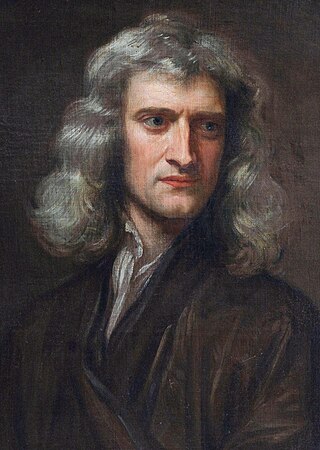
The following article is part of a biography of Sir Isaac Newton, the English mathematician and scientist, author of the Principia. It portrays the years after Newton's birth in 1642, his education, as well as his early scientific contributions, before the writing of his main work, the Principia Mathematica, in 1685.
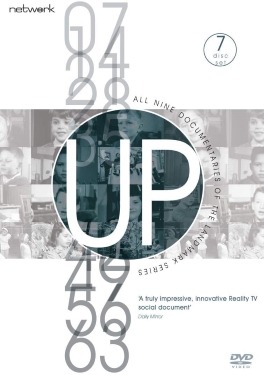
The Up series of documentary films follows the lives of fourteen people in England beginning in 1964, when they were seven years old. The first film was titled Seven Up!, with later films adjusting the number in the title to match the age of the subjects at the time of filming. The documentary has had nine episodes—one every seven years—thus spanning 56 years. The series has been produced by Granada Television for ITV, which has broadcast all of them except 42 Up (1998), which was broadcast on BBC One. Individual films and the series as a whole have received numerous accolades; in 1991, the then-latest installment, 28 Up, was chosen for Roger Ebert's list of the ten greatest films of all time.

The Newtonian telescope, also called the Newtonian reflector or just a Newtonian, is a type of reflecting telescope invented by the English scientist Sir Isaac Newton, using a concave primary mirror and a flat diagonal secondary mirror. Newton's first reflecting telescope was completed in 1668 and is the earliest known functional reflecting telescope. The Newtonian telescope's simple design has made it very popular with amateur telescope makers.
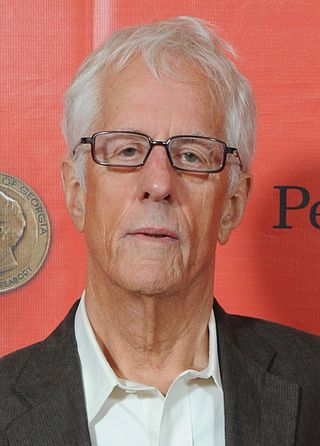
Michael David Apted was an English television and film director and producer.

The Isaac Newton Institute for Mathematical Sciences is an international research institute for mathematics and its many applications at the University of Cambridge. It is named after one of the university's most illustrious figures, the mathematician and natural philosopher Sir Isaac Newton and occupies one of the buildings in the Cambridge Centre for Mathematical Sciences.
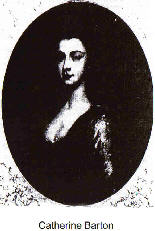
Catherine Barton (1679–1739) was an English homemaker who oversaw the running of the household of her uncle, scientist Isaac Newton. She was reputed to be the source of the story of the apple inspiring Newton's work on gravity, and his papers came to her on his death. She was rumoured to have been the mistress of the poet and statesman Charles Montagu and later married politician John Conduitt.
Alexandre Koyré, also anglicized as Alexander Koyre, was a French philosopher of Russian origin who wrote on the history and philosophy of science.

Isaac Newton was considered an insightful and erudite theologian by his Protestant contemporaries. He wrote many works that would now be classified as occult studies, and he wrote religious tracts that dealt with the literal interpretation of the Bible. He kept his heretical beliefs private.

In the history of calculus, the calculus controversy was an argument between the mathematicians Isaac Newton and Gottfried Wilhelm Leibniz over who had first invented calculus. The question was a major intellectual controversy, which began simmering in 1699 and broke out in full force in 1711. Leibniz had published his work first, but Newton's supporters accused Leibniz of plagiarizing Newton's unpublished ideas. Leibniz died in 1716, shortly after the Royal Society, of which Newton was a member, found in Newton's favor. The modern consensus is that the two men developed their ideas independently.
"Amazing Grace" is a Christian hymn.
Objectivity in science is an attempt to uncover truths about the natural world by eliminating personal biases, emotions, and false beliefs. It is often linked to observation as part of the scientific method. It is thus intimately related to the aim of testability and reproducibility. To be considered objective, the results of measurement must be communicated from person to person, and then demonstrated for third parties, as an advance in a collective understanding of the world. Such demonstrable knowledge has ordinarily conferred demonstrable powers of prediction or technology.
Patricia Chapple Wright is an American primatologist, anthropologist, and conservationist. Wright is best known for her extensive study of social and family interactions of wild lemurs in Madagascar.
Isaac Newton was an English mathematician, natural philosopher, theologian, alchemist and one of the most influential scientists in human history. His Philosophiae Naturalis Principia Mathematica is considered to be one of the most influential books in the history of science, laying the groundwork for most of classical mechanics by describing universal gravitation and the three laws of motion. In mathematics, Newton shares the credit with Gottfried Leibniz for the development of the differential and integral calculus.
Maya Burhanpurkar is a Canadian researcher.
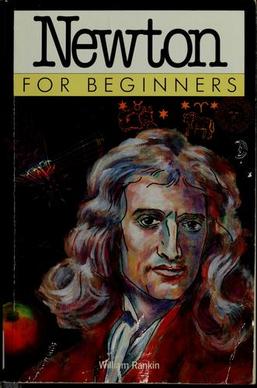
Newton for Beginners, republished as Introducing Newton, is a 1993 graphic study guide to the Isaac Newton and classical physics written and illustrated by William Rankin. The volume, according to the publisher's website, "explains the extraordinary ideas of a man who [...] single-handedly made enormous advances in mathematics, mechanics and optics," and, "was also a secret heretic, a mystic and an alchemist."

Newton, sometimes known as Newton after Blake, is a 1995 work by the sculptor Eduardo Paolozzi. The large bronze sculpture is displayed on a high plinth in the piazza outside the British Library in London.













